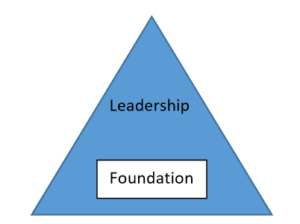NGOs are, more often than not, started and run by leaders with immense passion and with a mission to “save the world”. This is a laudable and absolutely necessary attribute. NGOs do their best work when they remain fully focused upon the goals they set themselves. They rely on talented people, often specialists, to deliver their chosen mandate and, in many cases, grow rapidly because of the need to fill the gap in delivering services expected of government or to supplement such services – often without recognition or official support, as such organisations are not hampered by ideology or bureaucracy. (And yes, you do hear a “but” coming!)
But, NGOs are businesses too and passion alone will not sustain them. NGOs need a solid foundation of business features to support their operations in order to grow and prosper securely. They do not need to make profits, but at the same time, they should not make losses.

Firstly, like a business, it is critical to make sure that the management and staff are highly-engaged and committed to taking self-directed action. This ensures that the leadership are not distracted by constant supervision.
But realising such engagement is not easy. It requires the elimination of “dissatisfiers” that make people unhappy in their positions and, at the same time, strengthening “satisfiers” that make people want to come to work and be productive. Implementing such an enabling environment in an NGO, however, should be easier than a “for-profit business” because the beneficial mission of an NGO is at the very heart of its existence and purpose. Nevertheless, the NGO requires the implementation of a secure foundation to keep people satisfied in the work environment and the primary building block for this is a well-managed and professional employment function.
The good news is that NGOs do not need to have large HR departments to carry out this function because it can be outsourced using Professional Employer Organisation Services (PEO). One of the main benefits is to have the NGO’s staff employed on an outsourced basis by the PEO especially where employment offered is over a specific period such as the duration of a specific project or a phase within a project on a fixed-term contract. This helps to keep the administrative overheads of the NGO at a manageable level which has significant advantages for sub-recipients where in many instances they undertake specific projects with specific funding for each project. As the projects are started and completed, staff are employed and then dismissed. Revenues may go up and down, but HR costs can be managed in this way to keep them in line.
The PEO can make sure that the NGO is fully compliant in terms of labour law, employee taxation, social securities and all related employment legislation. In South Africa, such legislation is extensive and stretches from the usual payroll administration, workman’s compensation, unemployment insurance, contracts of employment, job descriptions, critical skills and general work permits right through to skills development and Broad-Based Black Employment Equity. It is also essential in such a working environment to have the correct employment contracts, policies and procedures, employee benefit schemes, conflict resolution, contract and project termination processes. This will remove many of the major dissatisfiers in an organisation. In addition, best-practice remuneration with a well-established job-grading system will ensure that employees feel their salaries are fair and thus remove a common blockage to job satisfaction.
A further absolutely necessary support function in a solid foundation is financial management, including business and project reporting. It is essential that where specific projects enjoy specific funding from donors, the project financing is kept separate from other projects. It is surprising how many NGOs have a central bank account where all funding is deposited and then used for a number of different projects as well as administrative payments. This makes audit trails particularly difficult and the reporting of financial management to donors becomes quite unwieldy. Each project should have two bank accounts, one for transactions and a second one to hold spare project funds while earning interest. A further bank account should be used for the NGO’s administrative payments.
A final part of an NGO’s foundation, especially in a country like South Africa, is Community and Stakeholder Engagement. The local community plays a huge part in South African business affairs in both the profit and non-profit sectors and businesses and NGOs can only be sustainable if they focus on community liaison. Similarly, other stakeholders, as with employee-engagement above, like banks, auditors, insurance companies and other professionals, must be part of a well thought-out stakeholder engagement programme.
As an NGO grows, therefore, it is essential to put in place a solid foundation so that the donors are comfortable that the NGO has sound governance and administrative best-practices as an assurance of the responsible and effective application of their funding in achieving the NGO’s objectives.
David White is the CEO of DRG Outsourcing, Durban, South Africa, which provides professional and reliable human resource management services to small, medium, and large clients in both the for-profit and non-profit sectors.

